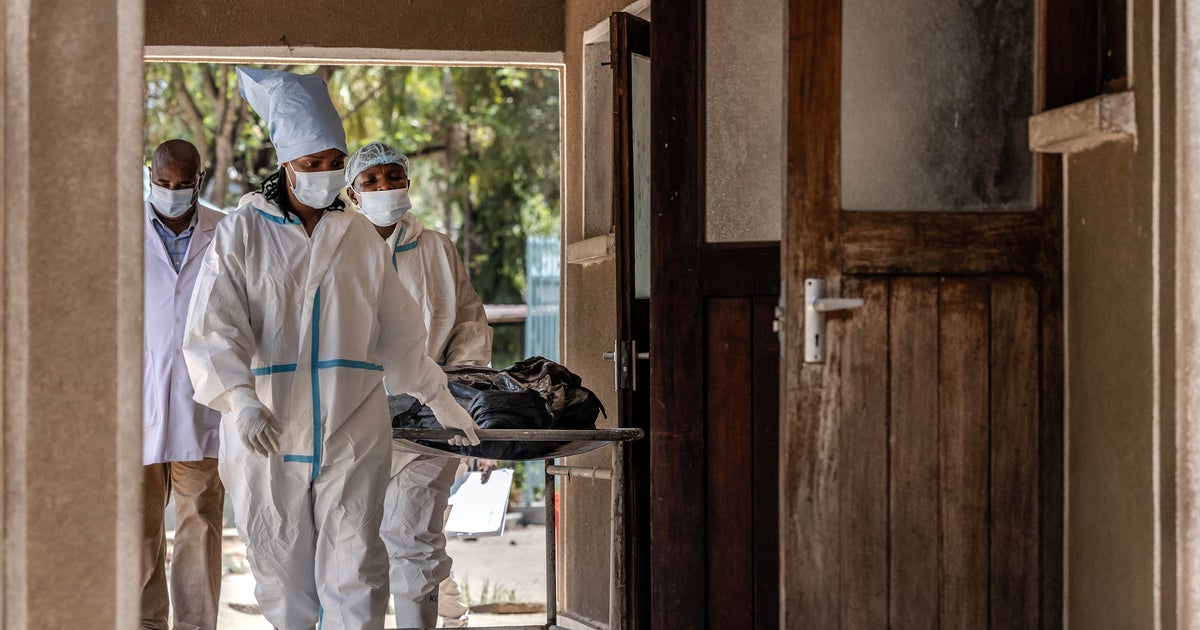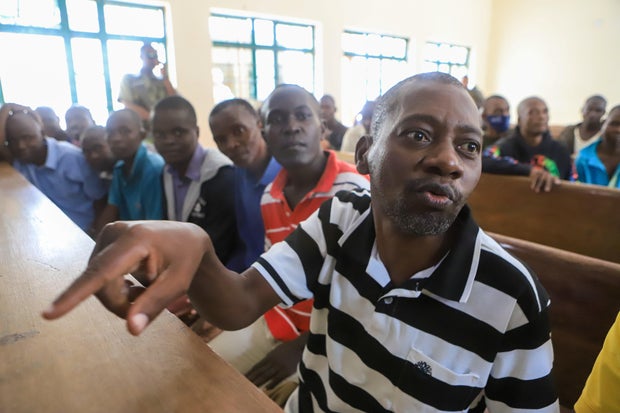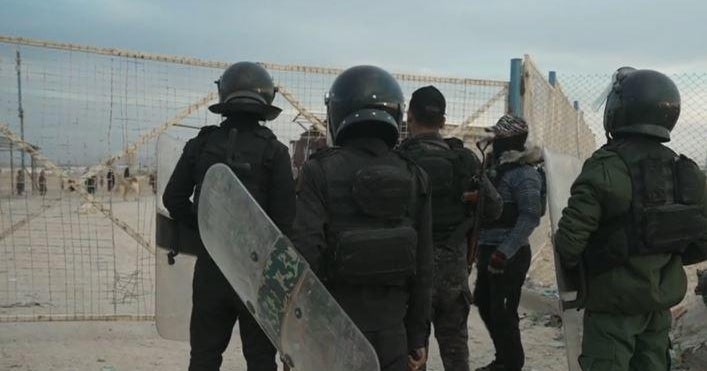CBS News
Doomsday cult leader Paul Mackenzie goes on trial after deaths of over 400 followers in Kenya

The leader of a doomsday cult in Kenya went on trial on Monday on charges of terrorism over the deaths of more than 400 of his followers in a macabre case that shocked the world.
Self-proclaimed pastor Paul Nthenge Mackenzie appeared in a packed courtroom in the Indian Ocean port city of Mombasa along with 94 co-defendants.
Principle magistrate Leah Juma ordered the removal of journalists from the court shortly after the start of the hearing to enable a protected witness to take the stand on camera.
Mackenzie, who was arrested in April last year, is alleged to have incited his acolytes to starve to death in order to “meet Jesus” in one of the world’s worst cult-related massacres.
The father of seven and his co-accused pleaded not guilty to the charges of terrorism at a hearing in January.
The 55 men and 40 women also face charges of murder, manslaughter, as well as child torture and cruelty in separate cases.
The remains of more than 440 people have been unearthed so far in a remote wilderness inland from the Indian Ocean coastal town of Malindi, in a case that has been dubbed the “Shakahola forest massacre.”
LUIS TATO/AFP via Getty Images
Autopsies have found that while starvation appeared to be the main cause of death, some of the victims — including children — were strangled, beaten, or suffocated. In February, Mackenzie pleaded not guilty to the murder of 191 children whose bodies were found in mass graves.
Previous court documents also said that some of the bodies had had their organs removed.
“Worst breach of security in the history of our country”
Prosecutors said in a statement that they planned to call about 90 witnesses to testify as well as show physical and digital evidence.
“The prosecution will present evidence to illustrate that the accused did not function merely as a fringe group, but rather as a well-organized criminal enterprise operating under the guise of a church under the leadership of (Mackenzie),” the statement said.
Mackenzie, a former taxi driver, turned himself in after police first entered Shakahola forest in April last year and found the bodies of four people and several other starving people.
The police action came after a relative of one of the victims received a tip-off from a former member of Mackenzie’s Good News International Church about grisly happenings in Shakahola forest.
Family members have said Mackenzie told his followers to join him in the Shakahola forest, where he offered them parcels of land for less than $100. Court documents allege that in early 2023, Mackenzie told his followers in the forest that the end of the world was coming and they must prepare through extreme hunger.
He allegedly split members into smaller groups assigned biblical names. It’s believed these smaller groups died together and were buried together in mass graves.
Andrew Kasuku/Anadolu Agency via Getty Images
Mackenzie had set up the church in 2003, but closed it in 2019 and moved to the sleepy town of Shakahola.
In March this year, the authorities began releasing some victims’ bodies to distraught relatives after months of painstaking work to identify them using DNA.
Questions have been raised about how Mackenzie, a self-styled pastor with a history of extremism, managed to evade law enforcement despite his prominent profile and previous legal cases.
Several surviving members of the group have told family members that what he preached would often come true, citing as an example his prediction that “a great virus” would come, just before COVID-19 hit the country. As people struggled during the pandemic, financially and medically, Mackenzie preached about leaving the difficulties of life behind and “turning to salvation.”
Interior Minister Kithure Kindiki last year accused Kenyan police of laxity in investigating the initial reports of starvation.
“The Shakahola massacre is the worst breach of security in the history of our country,” he told a senate committee hearing, vowing to “relentlessly push for legal reforms to tame rogue preachers.”
Reports by the Kenyan senate and a state-funded human rights watchdog have said the authorities could have prevented the deaths.
The Kenya National Commission on Human Rights (KNCHR) in March criticized security officers in Malindi for “gross abdication of duty and negligence.”
The horrific saga has seen President William Ruto vow to intervene in Kenya’s homegrown religious movements.
“What we are seeing … is akin to terrorism,” Ruto said last year. “Mr. Makenzi … pretends and postures as a pastor when in fact he is a terrible criminal.”
In largely Christian Kenya, it has also thrown a spotlight on failed efforts to regulate unscrupulous churches and cults that have dabbled in criminality.
In 2022, the body of a British woman who died at the house of a different cult leader while on holiday in Kenya was exhumed, according to the family’s lawyer. Luftunisa Kwandwalla, 44, was visiting the coastal city of Mombasa when she died in August 2020 and was buried a day later, but her family has claimed foul play.
Sarah Carter contributed to this report.
CBS News
CEO shooting suspect Luigi Mangione arrives in New York after waiving extradition in Pennsylvania

Watch CBS News
Be the first to know
Get browser notifications for breaking news, live events, and exclusive reporting.
CBS News
“Sleepmaxxing” trend has young adults optimizing their sleep. Experts share some do’s and don’ts.

How to get an ideal night of sleep has been trending on social media. It’s called sleep optimization, or “sleepmaxxing,” and it’s particularly popular among younger Americans.
From using sleep trackers to sleeping with mouth tape, social media users are sharing tips online for what they do to catch more Z’s — and millions of people are paying attention.
Kamila Charles, a college senior in Florida, is among the many young adults who are now prioritizing their sleep routine.
“Magnesium, I do my skin care, I put my hair in rollers,” she said of her nightly rituals. “I’m trying to figure out what works for me because it is hard.”
Another student, Craig James, told CBS News he makes sure his room is dark, quiet and cold for optimal sleep. “No television on, no nothing,” he said. Many sleep experts echo that advice.
One recent analysis found members of Gen-Z spend more time sleeping than any other generation. That same survey showed they also spent more time exercising and prioritizing self-care than others.
“They just want to make the quality better, which is a good thing,” Dr. Rafael Pelayo, a clinical professor at Stanford University’s Sleep Medicine division, told CBS News. “Even though they may be considered good sleepers overall, they want to make their sleep even better.”
A recent Gallup survey found a majority of Americans — 57% — said they would feel better if they got more sleep.
The American Academy of Sleep Medicine recommends 7 to 8 hours of sleep per night, though it depends on age and other factors.
Middle schoolers should get about 9 to 12 hours a night, high schoolers about 8 to 10 hours, and adults more than 7 hours, Dr. Nidhi Kumar recently told CBS News New York.
“How many high schoolers are really sleeping that much?” Kumar said. “We are a country that is chronically sleep deprived.”
Sleep scientist Vanessa Hill recently told CBS News the sleepmaxxing trend may be beneficial because it gets people thinking about their sleep.
“So I think overall, it’s good,” she said, but warned, “sometimes when people can be too perfectionistic about their sleep, it can backfire.”
Risks of the sleepmaxxing trend
Despite the wellness intentions, experts say some aspects of this trend could do more harm than good.
“A lot of the things people do are not necessarily evidence-based,” Pelayo said. He also warns against obsessing over smartphone sleep trackers.
Kumar agrees, saying the problem with tracking your sleep is it can become obsessive.
“People can actually start dealing with an anxiety about trying to get to sleep,” she said.
She also says people should avoid mouth taping, a practice many have seen on social media.
“I’m going to say a hard no to mouth taping. It can actually be quite dangerous. It can increase snoring. It can cause anxiety, suffocation. It can cause a reduction in oxygen levels in certain susceptible individuals,” she said.
Kumar advises against the many pills and potions being promoted online, but says two supplements can be useful.
“Certain forms of magnesium, magnesium threonate, crosses the blood brain barrier (and) can help with sleep,” she said. “And if you’re dealing with jet lag, melatonin can be helpful. Other than these two supplements, nothing else has really been shown to work.”
Benefits of better sleep
Sleepmaxxing is helping to repopularize certain aspects of good sleep hygiene that everyone should try to embrace, Hill said.
“Things like try not to use your devices for half an hour or so before bed. Try to stick to a consistent bedtime. Try to have a relaxing wind-down routine. All of these things can set us up for a good night’s sleep,” she said.
Improving sleep is a positive step for overall health.
Kumar said quality sleep can lead to fewer sick days because it boosts your immune system. It can also help you maintain better weight control and reduce your risk of other serious conditions.
“Lower rates of heart attack, stroke, diabetes and high blood pressure; better mood, better attention, less stress, less anxiety,” she said.
If you are having trouble with your sleep, it’s best to consult your doctor.
“TikTok is not the answer when you really do have a problem, and there are a lot of sleep problems out there,” Hill said.
CBS News
What happened inside the courtroom as Luigi Mangione waived extradition

Watch CBS News
Be the first to know
Get browser notifications for breaking news, live events, and exclusive reporting.









